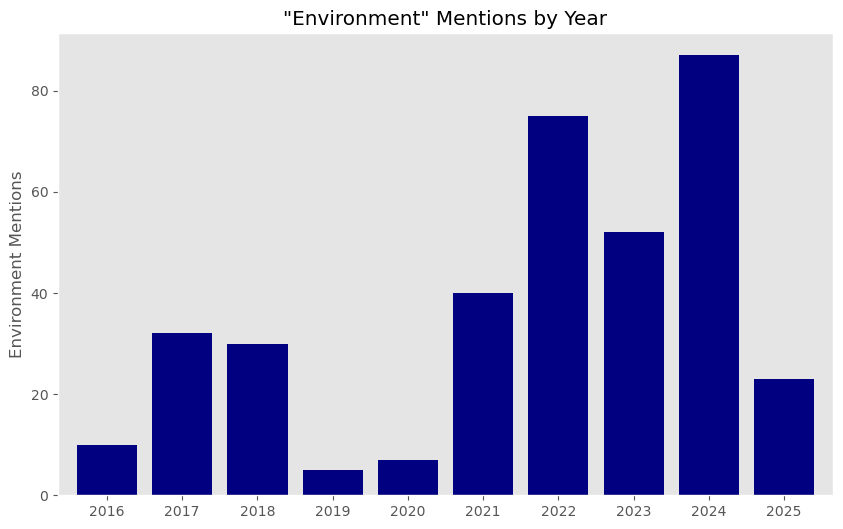Elon Musk
From climate crusader to controversial technocrat

As the driving force behind Tesla and SpaceX, Elon Musk built his public persona around bold solutions to global crises, most notably climate change. His early advocacy for electric vehicles, solar power, and carbon-neutral technology earned him the admiration of environmentalists and progressives alike. How has he become the object of so much suspicion and derision over the past few years?
Musk served on two environmental policy advisory councils during Trump’s first term but resigned shortly after the United States withdrew from the Paris Climate Agreement. At the time, he tweeted, “Climate change is real. Leaving Paris is not good for America or the world.” However, in a dramatic shift, Musk donated millions of dollars to Trump’s 2024 presidential campaign and was appointed to lead the newly formed Department of Government Efficiency (DOGE). Once celebrated as a brilliant CEO and innovator, Musk has recently dominated media headlines for his sudden political alliance with Trump and subsequent falling-out, overshadowing the environmental mission that once defined his legacy.
How has Musk’s alignment with President Trump influenced his evolving stance on climate policy? How is this relationship reflected in media narratives about his environmental credibility? To answer these questions, we examined every article mentioning “Elon Musk” in seven major newspapers and TV news outlets (The New York Times, The Washington Post, The Wall Street Journal, USA Today, Fox News, CNN, and MSNBC) from January 1, 2008, to March 1, 2025.

Our research reveals that environment-related terms (including all variations of: “environment”, “climate change”, “Paris”, “climate”, “sustainable”, “electric”, “energy”, and “global warming”) more than doubled in Musk-related articles between 2016 and 2017, which is when Trump announced that the United States planned to exit the Paris Climate Agreement. Media coverage regarding Musk at this time was largely centered around his criticism of Trump’s decision. For example, on June 6, 2017, Chris Hayes, a political commentator for MSNBC, stated on his All In show that “Elon Musk is at the forefront of the fight to rein in carbon emissions.” In May 2017, a New York Times article detailed how Musk “threatened to resign from two White House advisory boards if the president withdrew from the Paris agreement.”
In 2022, the media began to notice Musk’s growing affiliation with Trump and simultaneous shift in environmental stances. One New York Times article from November 2022 noted that Musk, who was “once beloved by liberals for electrifying the automobile industry to address climate change,” had posted a picture of himself with Trump, who had previously called global warming a “Chinese hoax.” In 2024, which saw the largest number of environment-related terms in articles mentioning Elon Musk, Tim Higgins – a Wall Street Journal columnist who has authored a book on Musk – wrote that “lately Musk sounds less urgent about climate change.” On September 6, 2024, during CNN’s This Morning, Gabby Birenbaum, a D.C. correspondent for The Nevada Independent, stated that Trump and Musk “have real differences when it comes to energy and climate change,” but noted that they have not seriously addressed their disagreement publicly.
This pattern of media coverage reflects a notable arc in Musk’s environmental policies and its perception in relation to his growing alignment with Donald Trump. In 2017, Musk was widely seen as a climate advocate willing to challenge presidential authority for the sake of environmental integrity. By 2022, however, that narrative began to fracture. As Musk grew closer to Trump, critics increasingly expressed doubt about the sincerity of his environmental advocacy, especially given Trump’s history of climate change denial.
By 2024, media coverage mentioning Musk was heavily dominated by his association with the Trump administration, specifically his sizable donations to the Trump 2024 campaign and his leadership of DOGE. For example, a New York Times article described Musk as a “pro-environment” and “super pro-climate” individual who “also threw himself wholeheartedly into electing as president someone who has dismissed global warming as a hoax.”
Compared to 2017, Musk is no longer viewed as a climate hero, but rather a billionaire whose motives are ambiguous. The media has tracked this transition closely, reflecting broader concerns about the authenticity of elite climate advocacy when it becomes entangled with power and partisanship. Now that Musk’s alliance with Trump has soured, it remains to be seen whether the media will rehabilitate Musk’s climate champion image or whether his fall from grace is irreversible.
—YiJun Kim and Daniza Tazabekova
Methodological note: We examined all 16,985 stories containing “Elon Musk” between January 1, 2008, and March 1, 2025, in The New York Times, The Washington Post, The Wall Street Journal, USA Today, Fox News, CNN, and MSNBC. We tagged articles for the following words and their variations: “environment,” “climate change,” “Paris,” “sustainable,” “electric,” “energy,” and “global warming.” For additional information regarding our methods, see here. Photo credit: REUTERS/Carlos Barria.